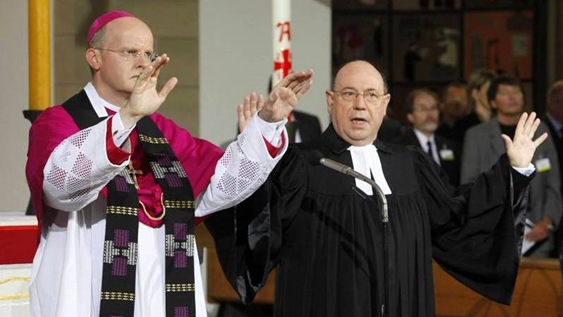Between the 18th and 25th of January, the Roman Catholic Church and the World Council of Churches organized the Week of Prayer for Christian Unity. Since 1958, the Week of Prayer has been a yearly exercise of “spiritual ecumenism” (i.e. joint prayer) that involves both the official ecclesiastical bodies of and the grassroots ecumenical movements. Its main theological premise is a call to common prayer for the unity of those who are “baptized”.[1]
At the end of the week, Benedict XVI presided over the final liturgy at St Paul’s basilica in Rome. In his homily, the Pope stressed the fact that unity is both given by God and a responsibility for all Christians. In their efforts towards unity, the doctrinal issues that cause the division between the Roman Catholic Church and other non-Catholic Christians should not be “neglected or minimized”. In this occasion too, Pope Ratzinger insisted on the fact that ecumenism is not a watered down, sentimental unity but is unity in the profession of the same faith, in the celebration of the same Eucharist, and united under the same sacramental ministry in apostolic succession.
As the Week of Prayer was about to commence, however, a curios event provided another perspective on the big picture of Roman Catholic ecumenism.
A Way Forward for “LutheRomans”?
In presenting his latest book on the main themes of Pope Ratzinger’s thought in a Roman bookshop next to the Vatican, Archbishop Gerhard Müller, who is Prefect of the Vatican Congregation for the Doctrine of Faith, made a comment on a possible prospect for the ecumenical process. Imagining a future scenario in which significant numbers of Lutherans would want to come in full fellowship with the Roman Church, Müller said that a specific “ordinariate” for them could be created in order to facilitate the transition. An ordinariate is a special diocese which allows full integration into the Roman Church while, at the same time, granting the acceptance of some aspects of the previous liturgical and spiritual tradition.
The pattern of the ordinariate has been already envisioned and implemented. In 2009 Pope Ratzinger provided for the constitution of “personal ordinariates for Anglicans entering into full communion with the Catholic Church”. In this case, the former Anglicans that are now Roman Catholics can celebrate the sacraments according “to the liturgical books proper to the Anglican tradition”. The ordinariate achieves the integration in the Roman system while paying tribute to its “catholicity” that is able to accommodate different traditions.
Archbishop Müller conceded that “the Lutheran world is a bit different from the Anglican one, because among Anglicans there has always been a sector closer to Catholicism.” However, he said, some Lutherans hope for a restoration of full communion with Rome, and the Church should be ready to receive them. He suggested that, as with Anglicans, the Catholic Church might allow Lutherans to preserve “the legitimate traditions they have developed” while becoming members of the Catholic Church. The idea was severely criticized by Lutheran officials.
How Does Visible Unity Work?
Apart from the technicalities of canonical law, what is worth considering is the overall picture that emerges from these comments. It is true that Archbishop Müller did not pronounce an official statement as if the decision was already made. Nevertheless, he expressed ideas that are given serious consideration in Vatican offices at both spectrums of the borders of the Roman Church. On her “right”, Rome is painstakingly trying to resolve the excommunication inflicted to the traditionalist Msgr Lefebvre and his followers in 1998. The means of achieving it is through an ordinariate whereby they could maintain their distinctive liturgical patterns while accepting that other Catholics would adhere to post-Vatican II developments. On her “left”, Rome is opening herself to former Anglicans and now, possibly, to groups of Lutherans wishing to embrace the Roman “catholicity” while keeping some of their Lutheran heritage. The ordinariate is the means by which the catholicity of the Roman Church can stretch itself on all sides while preserving the unity of the system around the sacramental institution.
The fact that these ideas were publicly spoken of in the ecumenical week is intriguing, but perfectly legitimate if one understands what ecumenism is all about for Rome. On the one hand, the Roman Church prays with other Christians for unity and rejoices for the unity that already exists. On the other, she makes provisions so that the full unity will be achieved through the incorporation of other Christians into her fold. According to the Roman view of unity, there is no contradiction between the two moves. As recalled earlier, the Pope in his homily remembered that Christian unity is not a general “unity-in-diversity” type of union, but the full expression of Christian unity, i.e. professing the same faith, celebrating the same Eucharist, being governed by the same authorities. This full or perfect unity subsists in the Roman Catholic Church alone. Other churches and communities are in one way or another “defective” in some important respects. After the Anglicans, it is now the Lutherans turn to have a special provision made to enjoy a “fuller” Christian life.
Leonardo De Chirico
leonardo.dechirico@ifeditalia.org
Rome, 31st January 2013
[1] The Evangelical Alliance Week of Prayer is a different initiative, though it usually runs a week before. It began in 1846, more than a century prior to the ecumenical week, and has a very different theological premise in that it encourages prayer amongst those who are believing Christians. The difference should be noted. Not all those who are baptized are necessarily Christian. The phenomenon of “nominal” Christianity is widespread whereby large numbers of a given population is composed of those who are baptized, but there can be few Christians amongst them.





